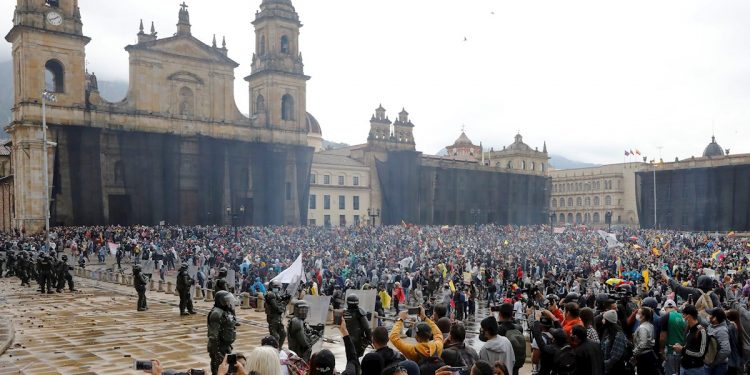The tax reform has fallen and the workers’ and popular mobilisation continues, demanding against the proposal and for Duque to go. On 2 May, the right-wing government of Ivan Duque announced the withdrawal of the bill of Tax Reform Law that had been presented a fortnight ago before the National Congress of that country, with the pompous name of Sustainable Solidarity Law.
On 28 April, the National Strike Command made up of the three central trade unions and Fecode, the federation that brings together the country’s teachers, called a national strike, which was also joined by student organisations, the indigenous Minga (meeting) and organisations from various rural and urban communities.
Since then, the strike has been manifested in the major cities of the country through massive mobilisations. The epicentre has been the city of Cali, capital of Cauca Valley, where the protests have been massive and the strike is almost total, with roadblocks to the surrounding areas. In Bucaramanga, bus drivers and taxi drivers called a strike starting today, Monday. Similar reactions are taking place in Manizales, Barranquilla and Medellín. In the country’s capital, Bogota, mobilisations and road blockades continued on Monday, 3 May.
Last Tuesday, the Duque government had announced the militarisation of the cities to stop the movement with repression. Despite the strong repression, which has already left 17 dead, over 800 injured and 431 arrested, the demonstrations continued, and the following day they forced him to withdraw the tax reform.
In Colombia, a great social tension has been building up because of the severe austerity package that the pro-Uribe government of Duque has been promoting, affecting the popular sectors. Already on 21 November 2019, another national strike took place, which was accompanied by massive mobilisations in the major Colombian cities.
With the pandemic, the situation of workers and the poorest sectors have worsened. The demonstrations sprung amid a strong resurgence of Covid-19. The pandemic has already killed 72 thousand people, has caused company closures, thus deepening unemployment and poverty. Besides, the country has failed to launch a massive vaccination plan.
But what broke the patience of the Colombian working people was the content of the reform that increased taxes on the poorest sectors and middle-class workers, and the 19 per cent VAT on public services such as water, electricity and gas, funeral services, electronic items, computers, which until now were exempt from VAT. As you can read on a banner at the protest: “If the people take to the streets amid a pandemic, it is because the government is more dangerous than the virus.”
The Duque government itself made it public that 73 per cent of the revenue would come from individuals and only 27 per cent from companies, in a country where the financial sector in 2020 only paid 1.9 per cent of its millionaire profits in taxes.
The massive mobilisation throughout the country, with the youth playing a leading role, stopped the tax reform, which was one of the key aims of the strike decreed on 28 April. The crucial fact is that the struggle continues throughout the country, with the removal of the hated riot police, the ESMAD, and the ousting of Duque now on the agenda.
Miguel Angel Hernandez,
3 May 2021













